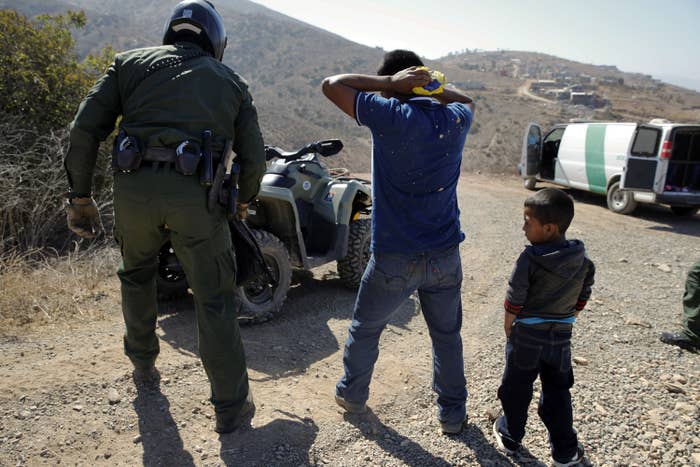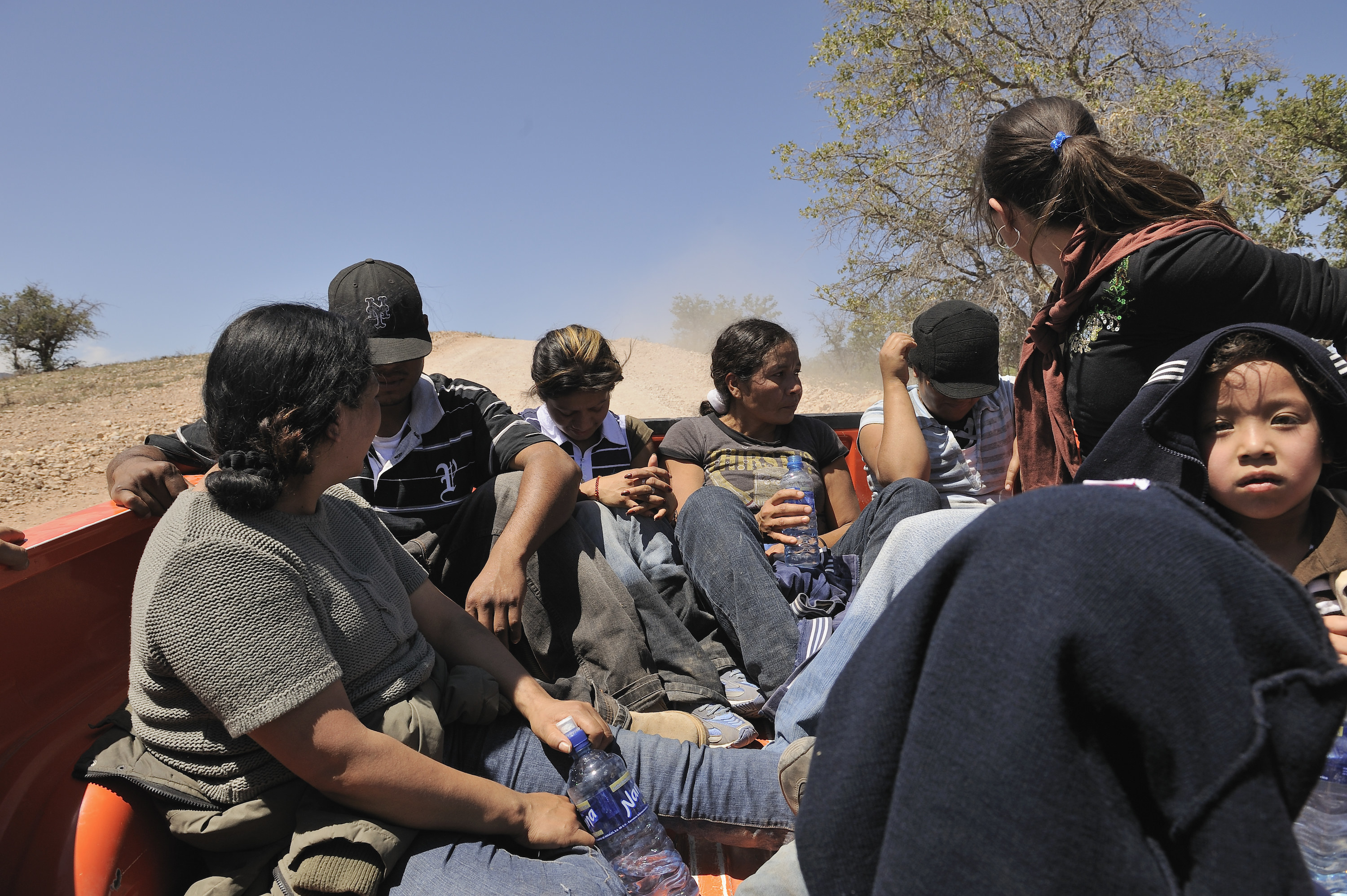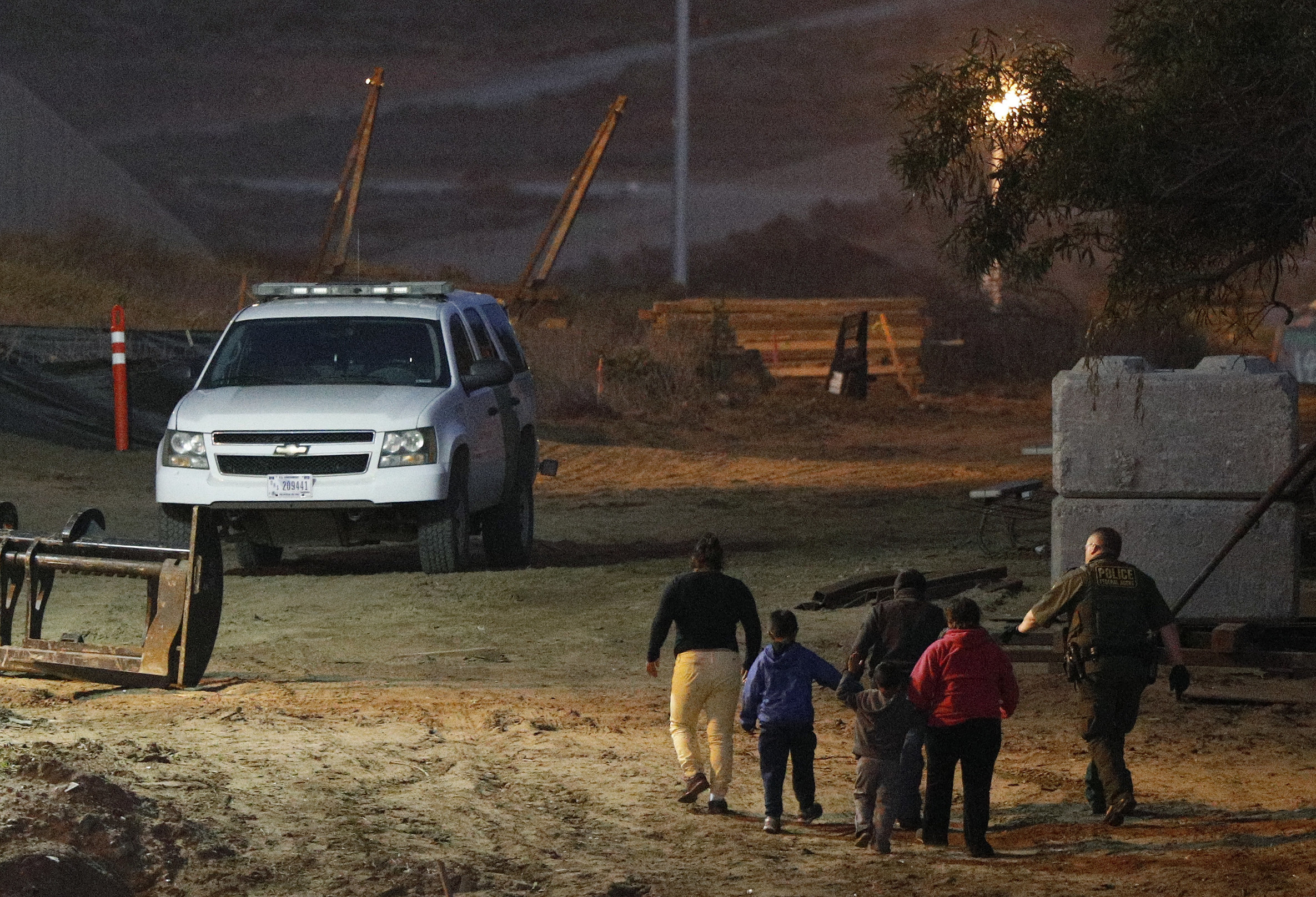
MCALLEN, Texas — Mexican families seeking protection are accusing Border Patrol agents in Arizona of illegally deporting them and denying them access to asylum despite being on United States soil, according to complaints filed with the government.
At various official border crossings, Customs and Border Protection, the parent agency for Border Patrol, has been turning away asylum-seekers from Mexico, Central America, and other countries before they set foot in the US, citing limited space at ports of entry. But in these cases, the Mexicans seeking asylum were already in the US. When they expressed to Border Patrol agents a fear of being sent to Mexico, they were deported without being given the chance to access asylum, according to the complaints filed in recent weeks.
"This is very clearly illegal," said Joanna Williams, the director of education and advocacy at the Kino Border Initiative.
A recent government watchdog report found instances of CBP officials deporting asylum-seekers to Mexico after they had entered the US. The Department of Homeland Security's Office of Inspector General said the agency broke federal law and went against CBP policy, which requires that immigrants seeking protection who are already in the US be processed.
CBP did not return requests for comment.
This has been an issue for years, Williams said, but the number of cases her organization has seen in recent months has been higher.
From 2015 to 2018, the Kino Border Initiative — a binational nonprofit based in Nogales, Arizona, that works with immigrants — filed an average of six complaints per year regarding wrongful removals. In comparison, it has filed six complaints in the last six weeks — and those were just the families who decided to file complaints.
Williams said the organization has worked with 15 families in the last six weeks who said they were quickly deported despite expressing a fear of returning to Mexico after being apprehended by Border Patrol in Arizona. The families said they don’t believe their fear of returning to Mexico was ever documented by agents.
"It's becoming more widespread and frequent," Williams told BuzzFeed News. "In the past we thought perhaps it was an issue with individual agents or maybe a lack of supervisors, but now our impression is this is systemic."
Immigrants who express a fear of returning to their countries to a DHS officer are supposed to get a credible fear interview. The interviews are a crucial first step in the asylum process to determine whether an immigrant has a credible fear of being persecuted in their country. DHS officers, such as Border Patrol agents, are also required to ask immigrants if they have a fear or concern of being returned to their home country under the agency’s policies and procedures.
The wait for asylum-seekers to be processed at a port of entry in Nogales is currently two months long. These families could wait, but if they don’t and are caught by Border Patrol trying to cross through the desert again, the parents could face illegal reentry charges and run the risk of being separated from their children, Williams said.
“If Border Patrol didn’t mark they had a fear of return, they now have inaccurate paperwork following them around in addition to the risk of being prosecuted,” Williams said.
The Trump administration has rolled out policies aimed at non-Mexican asylum-seekers such as the Migrant Protection Protocols, which forces people to wait in Mexico while their immigration cases are adjudicated, or a rule that generally bars asylum for immigrants who traveled through another country before arriving in the US without being denied refuge there first.
"In a similar vein though less visibly, Border Patrol is attempting to prevent Mexican families from accessing asylum through the increasing frequency of wrongful removals," the Kino Border Initiative said in a statement.
The complaints come on the heels of Acting Secretary of Homeland Security Kevin McAleenan saying that his agency had effectively ended "catch and release" through various initiatives. The release of immigrants into the US with upcoming court dates after being detained been pejoratively called "catch and release" by President Trump and immigration hawks. Immigration officials have blamed federal court decisions that limit how long children can be held in detention, which has resulted in families being released from immigration custody, saying it’s a magnet for people considering crossing the border.

BuzzFeed News reviewed redacted portions of the complaints filed to the federal government by the Kino Border Initiative that didn't include the names of the Mexican asylum-seekers who feared being publicly identified. The complaints were filed with the DHS's Office for Civil Rights and Civil Liberties, OIG, and CBP.
In one testimony, a Mexican family said they were pressured into signing deportation documents. The mother signed after being pressured; the father didn’t sign and was deported anyway.
The father said a Border Patrol agent at the Nogales, Arizona, Border Patrol station told him: "We aren't giving asylum any more. Either you sign or you don't sign but you will be deported." His wife, who was in another room, was told to sign the papers quickly; she signed although the documents were in English. The agent did not explain the information to her, the complaint said.
The father refused to sign; after he was told "You have to put down your fingerprint" by the Border Patrol agent, he pressed his finger on the document though never signed it. The family was then deported to Nogales in the Mexican state of Sonora on Aug. 30.
In another complaint, a Oaxacan family fleeing death threats after their daughter witnessed a murder said they were deported without getting a credible fear interview despite requesting asylum after they were detained on Sept. 7. At a Border Patrol station in Nogales, Arizona, the mother said she was told by an agent to sign documents in English that were not explained to her. She said she was not asked if she was afraid of returning to Mexico.
The mother told an agent afterward that the family had a fear of returning to Mexico and was told, "This isn't the place to explain that. You are going to another place." On Sept. 9, the mother said, Border Patrol agents brought the family to a station in Tucson, but did not ask any additional questions or about their fear of return. The family was deported that evening.
Another Mexican immigrant who was detained in Arizona said he told a Border Patrol agent that he wanted to seek asylum because there was a lot of violence where he lived.
"Illegals and Mexicans don’t have a right to anything," the Border Patrol agent said, according to the complaint. "We’re not giving you asylum. My wife has been without work for three years, so we can’t give you work."
The Border Patrol agent continued to ask the asylum-seeker to sign a deportation form, but the Mexican immigrant said he couldn't return to his country out of fear.
"It’s a lie, we’re not giving asylum. Tell other people that we’re not giving that anymore," the complaint accuses the Border Patrol agent of saying. "If you try to return, we’re going to put you in jail and separate you from your kids.”

Williams said the accounts of Mexican asylum-seekers was particularly concerning because Border Patrol agents, instead of asylum officers, are starting to conduct credible fear interviews for families at a detention center in South Texas. The Border Patrol interviews at the South Texas Family Residential Center in Dilley were first reported by the Los Angeles Times.
"If Border Patrol as part of their current jobs in Arizona can't check the right box on a form that says someone expressed a fear of being returned to their country, I have very little faith they'll write down the correct information during a credible fear interview and make appropriate evaluations," Williams said.
It's expected that Border Patrol agents will eventually expand to doing these interviews beyond the family detention center.
Undocumented immigrants caught within 100 miles of the border and who had entered the US within two weeks can be quickly deported under expedited removal, which allows an immigration agent to remove them without seeing a judge. Expressing a fear of being sent back to their country is supposed to offer immigrants in this process a credible fear interview that can start the asylum process and stop their fast-tracked deportation.
The Trump administration tried expanding expedited removal to undocumented immigrants who cannot prove they have been in the country continuously for two years, but it was blocked by a preliminary injunction last week.

The process for deporting non-Mexican immigrants takes longer due to logistics, such as getting travel documents and flights for them. Because they're sent to ICE custody, non-Mexicans have more opportunities to request protection from immigration authorities they interact with beyond border agents and get a credible fear interview.
Mexicans, on the other hand, can be walked across the border within hours and without seeing another agency. As a result, they're at the mercy of border agents when it comes to getting a credible fear interview, said Clara Long, acting deputy Washington director for Human Rights Watch.
Long said she's been tracking and investigating cases of CBP not writing correct information on immigrants' documents that resulted in the wrongful deportation of people or instances where people aren't sent to have interviews with asylum officers.
"It's super worrying," Long told BuzzFeed News. "But this issue with Mexicans is broader. It's the institutional acceptance of bullying and of fraudulent creation of documents that we've seen for expedited removals for some time now."
When Long wrote a 2014 report on this issue, she said DHS leaders said they would communicate to CBP that it is its job to accurately screen asylum-seekers.
"I can imagine how that message would not be getting across to Border Patrol agents and supervisors in this moment in history," Long said. "You have a president who is trying to see if Border Patrol agents can shoot migrants in the legs as they come across."

